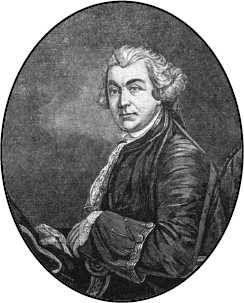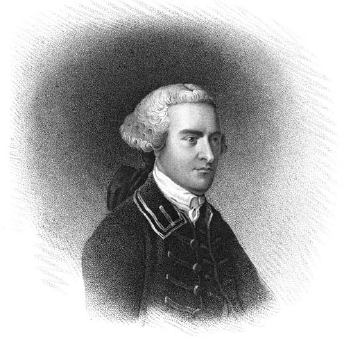American Tempest (11 page)
Authors: Harlow Giles Unger

After Hancock luxuriated in Boston's merchant banking milieu, news of Braddock's disaster in the West reached Boston and imbued the city with a sense of impending crisis. As senior military official in America, Massachusetts Governor William Shirley took immediate command of all British forces in the thirteen colonies. At Shirley's behest, Thomas Hancock assembled thirty-one ships in Boston harbor, and two regiments of New Englandersâabout two thousand menâset sail for Canada. The British tacked to the northernmost shore of the Bay of Fundy in Nova Scotia and, in a surprise attack, overwhelmed Fort Beausejour, leaving the entire French garrison dead or captured. By the end of the month, the British captured all the lands along the shore of the Bay of Fundy, including settlements with about six thousand French-speaking, Roman Catholic Acadians, whom the British adjudged potential rebels. Ordered to swear allegiance to the English crown or be expelled, they chose exile, and British troops obliged, forcing three thousand men, women, and children to board eighteen Hancock ships at bayonet point and watch as other troops burned their homes and villages. The dispersal went on for months, with the House of Hancock sending bills for “digging graves” and, in one instance, for “burying of 2 French children.” Thomas Hancock expressed satisfaction to his British agent that Nova Scotia was “pretty clear of those vermin. . . . For God's sake, then let us root the French blood out of America.” As quartermaster general, in effect, for two enormously successful British military enterprises, Thomas Hancock had become a staunch, outspoken British imperialist, and his nephew echoed his words.
6
In February 1757 the British government appointed Cambridge-educated Thomas Pownall, a former deputy governor of New Jersey, as governor of Massachusetts. He immediately conferred with Boston's business leadersâThomas Hancock among themâto develop a plan for pursuing
the war more vigorously. A champion of a more aggressive policy toward the French and Indians, Thomas Hancock offered Pownall his full political and logistical support. Expelling the French from America, Hancock enthused, “will be the salvation of England, for in forty years this very America will absolutely take all the manufactury of England. . . . Whoever keeps America will in the end (whether French or English) have the kingdom of England.”
7
He had good reason to be enthusiastic: He was already earning more than £30,000 a year from the war, and the new governor now asked him to help raise and supply an additional militia of seven thousand men.

Hancock's zeal for punishing Acadians seemed to wane, howeverâespecially after seeing a pitiful group that was captured in Boston trying to make their way home from the Carolinas. While they languished in prison awaiting transport back to exile in North Carolina, the Governor's Council, or upper house of the legislature, asked Hancock to provide them with food. During that time, Hancock experienced a change of heart and asked
the Council to be “compassionate [about] their unhappy circumstances” and free them. The Council complied.
By 1758 Hancock had become the primary financier and procurement officer in America for the British military, and the defense ministry at Whitehall in London appointed him “His Majesty's Agent for Transports,” thus putting an official cachet on the unofficial role he had played for a decade. The appointment extended Hancock's authority beyond procurement to include payment of enlistment bounties to seamen, provisioning the fleet, chartering cargo ships for the military, and handling payrolls. Generals and civilian governors were to turn to the House of Hancock for all supplies and payrolls. For his efforts, from 1754 to 1760 Thomas Hancock received 5 percent of the costs of conducting the French and Indian War as well as appointment to the Governor's Council, which handled most of the colony's finances. The huge burden of work forced him to turn over more responsibilities to his nephew John, and in 1763 he made his nephew a full partner and gave him direction of the firm, which changed its name to Thomas Hancock & Nephew.
A year later, on Wednesday, August 1, 1764, sixty-one-year-old Thomas Hancock walked down Beacon Hill for a meeting of the Governor's Executive Council at the Town House and collapsed as he entered the Council chamber. Council members carried him back to his mansion, where he died of a stroke, leaving his twenty-seven-year-old nephew John as Boston's new merchant king and one of the wealthiest men in America. John Hancock's ascension to wealth and power would change the course of America.

The Flame Is Spread
J
ohn Hancock could not have inherited his uncle's business at a worse time. After writing to all his agents, customers, and suppliers of his intention “to carry on the business . . . by myself,” he pressed ahead valiantly with his uncle's expansion plans, but the postwar economic slump had deteriorated into a full-scale depression. Many merchants had overstocked because of the seemingly endless demand that the war had created. By the spring of 1763, six months after Britain had silenced her cannons, several major Boston mercantile houses collapsed while others trembled ominously on their foundations.
Part of the problem lay in slow communications. By the time the first ship arrived from London with news that the war had ended, merchants had long earlier placed their orders for merchandise that would no longer be needed. Then, toward the end of 1763, a small pox epidemic sent citizens fleeing the city, leaving merchants and shopkeepers crushed by piles of unsold Christmas inventories and no one to buy them. One after another, Boston's merchantsâsome of them leaders in the fieldâclosed their doors: the gigantic house of Nathaniel Wheelwright, the equally large firm of John Scollay, chairman of Boston's Board of Selectmen, and many others.
As the end of 1764 approached, John Hancockâlike Thomas Hutchinson, Thomas Cushing, the Oliver brothers, and other surviving merchantsâwrote to his English agents to cancel orders for the following spring. “Trade has met with a most prodigious shock,” Hancock explained. “Money is extremely scarce . . . times are very bad . . . take my word, my good friends, the times will be worse here.” Hancock said that the wave of failures had left him unable to buy any more goods from England, and he warned that “if we are not relieved at home we must live upon our own produce and manufactures.”
1
Like New England's other merchants, Hancock was simply not prepared for peace when the Seven Years' War came to an end in 1763. For the better part of two centuries, New England's economy had been based on war or the threat of war. Thomas Hancock had built the House of Hancock on war profits, and his nephew Johnâas well as Boston's other merchantsânow discovered peace to be highly unprofitable in a frontier society where consumers can provide for themselves by converting raw materials from the wilds into tools, clothes, food, and other essentials. Barter made moneyâand merchantsâsuperfluous much of the time. Only the military relied on merchants on a regular basisâfor arms, ammunition, clothing, food, and transportâbut the end of the Seven Years' War reduced such purchases and collapsed the American economy. And it was that momentâearly in 1764âthat the British government picked to raise taxes. Its timing could not have been worse.
Merchants from Boston to Charleston, South Carolina, wrote to their agents in Britain protesting Grenville's American Revenue Act and Currency Act. As Parliament debated the Stamp Act, the letters grew into a torrent that goaded British merchants to protest to Parliament. In Parliament, future prime minister Charles Townshend responded angrily, calling the colonists “children planted by our care, nourished up by our indulgence . . . protected by our arms.”
The colonists had their champions in Parliament, howeverâamong them Colonel Isaac Barré, M.P. for Chipping Wycombe, who had fought in the French and Indian War and acquired many American friends. “They planted by your care?” he bellowed in response to Townshend.

No! Your oppressions planted them in America. They fled from your tyranny to a then-uncultivated and inhospitable countryâwhere they exposed themselves to almost all the hardships to which human nature is liable.
They nourished by your indulgence? They grew by your neglect of them. As soon as you began to care about them, that care was exercised in sending persons to rule over them, in one department and another.
They protected by your arms? They have nobly taken up arms in your defence, have exerted a valor amidst their constant and laborious industry for the defence of a country, whose frontier, while drenched in blood, has yielded all its little savings to your emolument. And believe me, remember I this day told you so, that same spirit of freedom which actuated that
people at first, will accompany them still. . . . The people I believe are as truly loyal as any subjects the king has, but they are a people jealous of their liberties who will vindicate them, if ever they should be violated.
2
Although “the whole house sat a while, amazed, intently looking and without answering a word,” it voted 245 to 49 in favor of proceeding with the proposed stamp tax.
3
After word of Parliament's action arrived in America, Boston's merchants gathered to dine at the Merchants Club and, after mutters of dismay, accepted the inevitable and toasted the king and motherland. “I am heartily sorry for the great burden laid upon us,” John Hancock wrote to his London agent. “We are not able to bear all things, but must submit to higher powers, these taxes will greatly affect us, our trade will be ruined, and as it is, it's very dull.” Then, turning to what remained for him a more important topic, he ordered “two pipes [about 125 gallons each] of the very best Madeira for my own table. I don't stand at any price, let it be good, I like rich wine.”
4
At heart, John Hancock was no rebel and, indeed, tried to mediate behind the scenes with a letter to former Massachusetts royal governor Thomas Pownall, who had retired in England but had been a close friend of Thomas Hancock and the rest of Boston's mercantile aristocrats.
“I seldom meddle with politics,” Hancock opened.
I know the goodness of your disposition towards us, and I wish we could be helped out of our present burden and difficulties. Our trade is prodigiously embarrassed and must shortly be ruined under the present circumstances, but we must submit. . . . I, however, hope we shall in some measure be relieved, and doubt not your good influences to forward it.
5
